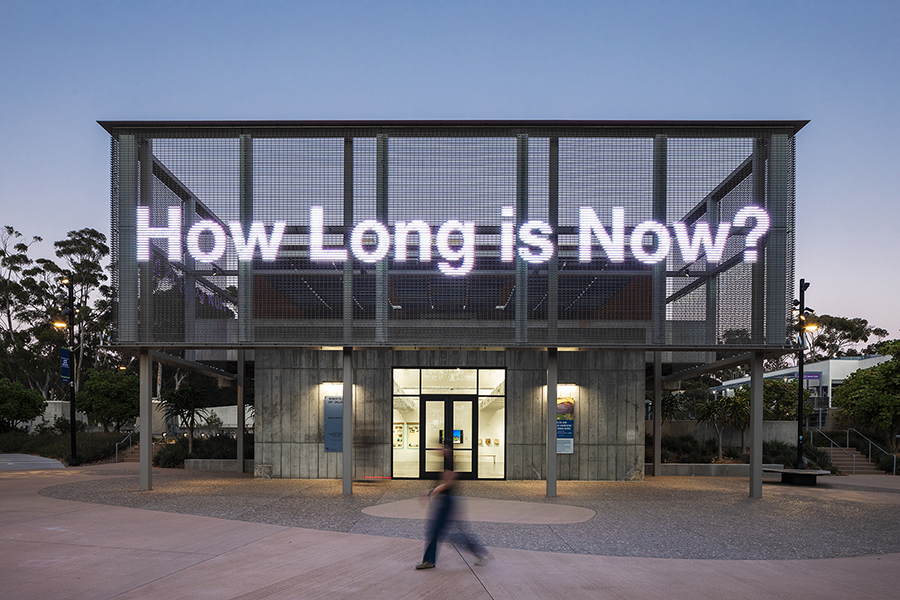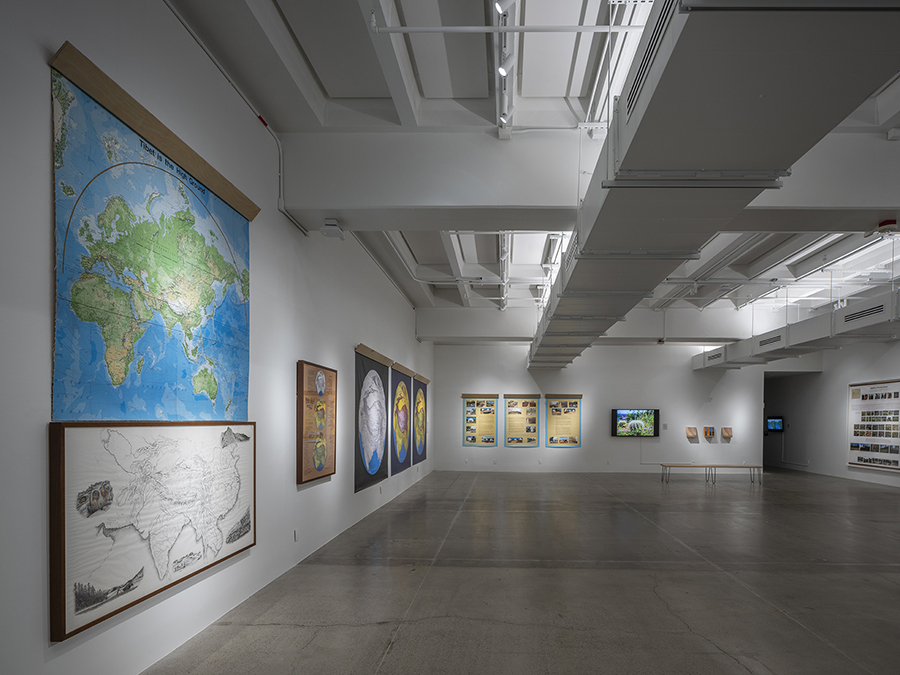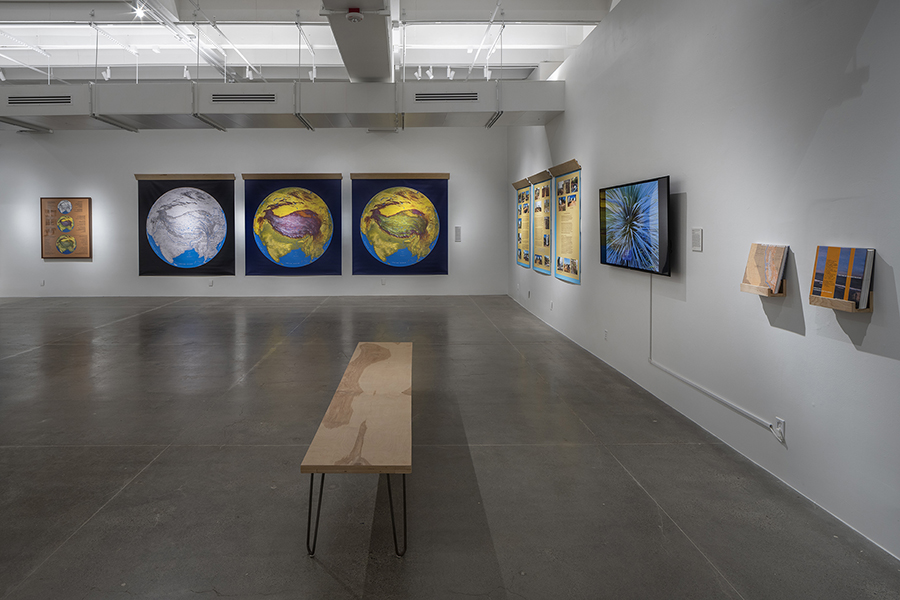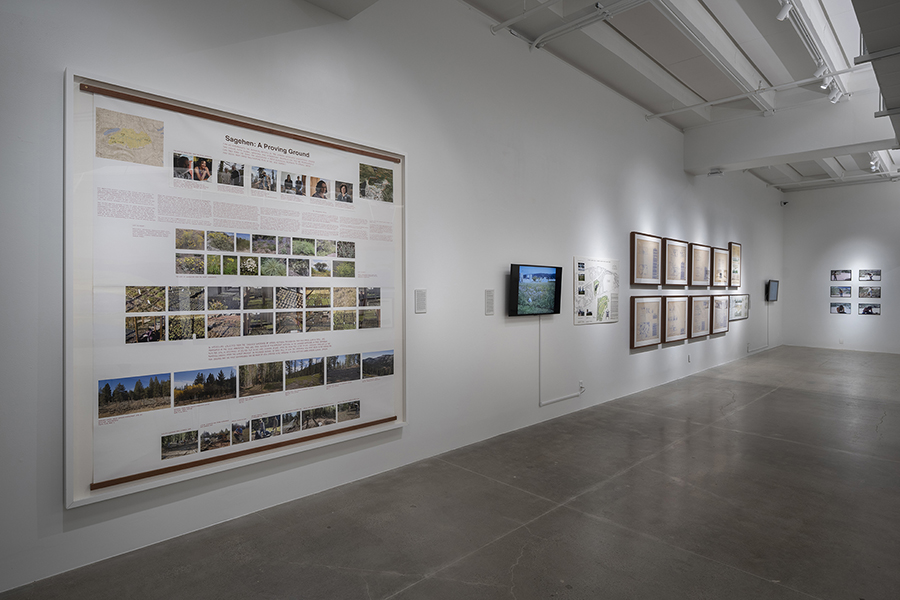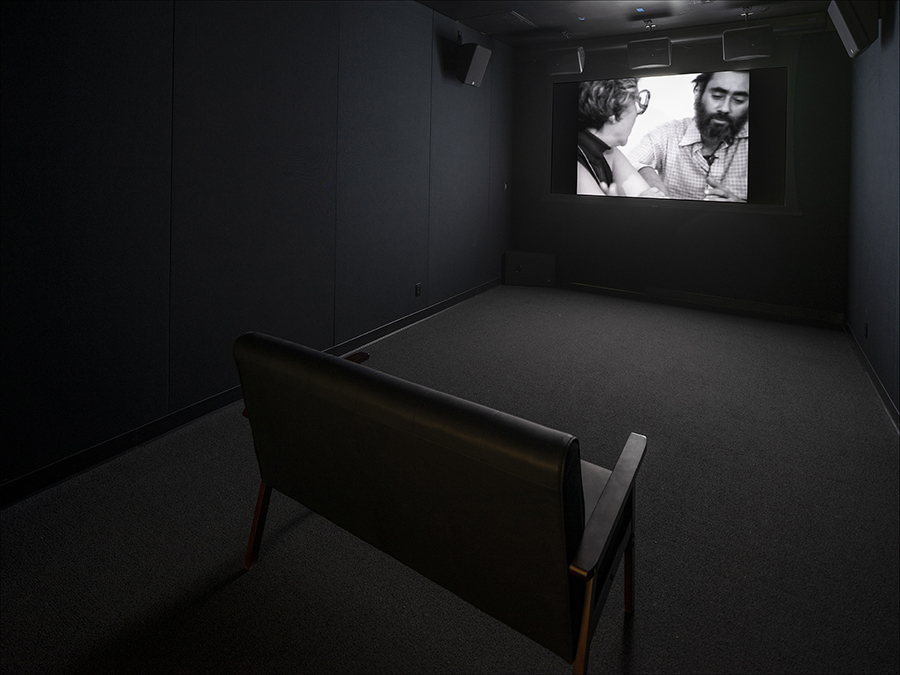Helen and Newton Harrison:
California Work
September 28-December 7, 2024
As part of the Getty Foundation’s PST ART: Art and Science Collide, the Mandeville Art Gallery at UC San Diego presents Helen and Newton Harrison: California Work, a retrospective exhibition about the work of husband-and-wife team of Helen Mayer and Newton Harrison, who were among the earliest and most notable ecological artists. Founding members of the Visual Arts Department at UC San Diego, Helen and Newton were local San Diego artists for nearly four decades, where they developed their pioneering concepts of Ecological Art.
Helen and Newton Harrison: California Work is the first exhibition to focus on their California work, including nearly 20 projects produced between the late 1960s and 2000s. Responding to growing environmental awareness, the Harrisons pushed conceptual art in new directions, from their efforts to make topsoil—endangered in many places—to their transformation of a Pasadena debris basin into a recreational area. The couple agreed that they would only take on projects that benefited the ecosystem. California Work revisits the Harrisons’ groundbreaking ecological concepts through re-staged performance artworks, drawings, paintings, photography, collages, maps, archival documentation of large-scale installations, and unrealized proposals for real-world ecological solutions. A 17,600-square feet four-part exhibition about this pioneering couple is presented as a multi-site exhibition in four locations around San Diego simultaneously in Fall 2024: La Jolla Historical Society, California Center for the Arts Escondido, San Diego Central Library Gallery, and the Mandeville Art Gallery. The exhibition locations examine the California works chronologically and thematically: Urban Ecologies, The Prophetic Works, Saving the West, and Future Gardens.
Future Gardens, presented at the Mandeville Art Gallery, speaks to the Harrisons’ hope of saving the planet in the face of the crisis posed by climate change and its threat to Earth’s many ecosystems. The viewer will enjoy original drawings, phototext panels, photographs, and conceptual design proposals documenting Tibet as a High Ground (1990-2016), Garden of Hot Winds and Warm Rains (1995/2003-8), Sagehen: A Proving Ground (2007-ongoing, in the High Sierras near Tahoe), and the Future Garden for the Central Coast of California (2018-ongoing, at the Arboretum at UC Santa Cruz). Through immersive installations, Future Gardens will reveal the Harrisons’ concept of Force Majeure and their adaptive responses to the pressure on planetary systems that are negatively impacted by industrial processes as global warming accelerates.
Curated by Tatiana Sizonenko (UC San Diego, PhD '13)
Image: Helen and Newton Harrison: California Work Installation Views, Mandeville Art Gallery, September 28-December 7, 2024 (Photos by Pablo Mason)
See more Helen and Newton Harrison: California Work at:

Public Programs
Opening Celebration of "Helen and Newton Harrison: California Work"
Saturday, September 28th from 2-6pm
Location: Mandeville Art Gallery
Thinking with the Harrisons: Re-imagining the Arts in the Global Environment Crisis
Keynote Lecture by Anne Douglas and Chris Fremantle with introduction by Dr. Alena Williams (Associate Professor, Department of Visual Arts)
Tuesday, November 19, 2024, 6:30 pm
Location: SME 149, Structural & Materials Engineering, UC San Diego
Helen Mayer Harrison and Newton Harrison, known as ‘the Harrisons’, dedicated five decades to exploring and demonstrating a new form of artistic practice, centered on “…doing no work that does not attend to the wellbeing of the web of life.” Their collaborative practice pioneered a way of drawing together art and ecology. They closely observed, often with irony and humor, how human intervention disrupts the dynamics of life as a web of interrelationships. The authors ‘think with’ the Harrisons, critically tracing their poetics as a re-imaging and reconfiguring of the arts in response to the unfolding planetary crisis. They draw parallels between the artists’ poetics and rethinking in the philosophy of science, particularly drawing on the philosopher of science, Isabelle Stengers.
Thinking with the Harrisons is for anyone concerned with the implications of ecological thought and practice as a reimagining of public life, including the interaction of art and science. Throughout their joint practice, the Harrisons sought to engage policy makers, governments, ecologists, artists, and the natural world, sensitizing us to the crises that emerge from grounded experiences of place and time.
Anne Douglas is a Professor Emerita, Gray’s School of Art, Robert Gordon University, Scotland, exploring the changing place of the artist in public life. This research has increasingly focused on art and the environmental crisis from a practice-led research perspective. She co-produced the Harrisons’ work “On the Deep Wealth of this Nation, Scotland” (2017) in collaboration with Newton Harrison and the Centre for the Study of the Force Majeure, University of California Santa Cruz.
Chris Fremantle is a researcher and producer of award-winning projects. He was producer on the Harrisons’ project “Greenhouse Britain: Losing Ground, Gaining Wisdom.” He is a longstanding member of the international ecoart network and co-editor of “Ecoart in Action,” a collection of activities, case studies and provocations drawn from the network. He lectures at Gray’s School of Art, Robert Gordon University, Scotland.
Future Gardens as Eco-Cultural Collaborations
Panel Discussion
Saturday, November 23, 2024, 2:00-4:00 pm
Location: Mandeville Art Gallery
The Harrisons describe their first Future Garden, the Garden of Hot Winds and Warm Rains (1995), proposed for a museum in Bonn as “...a multi-layered story told with artifacts, media events, texts, and living materials, which all together engage the probable Greenhouse future directly. It is a work of art that will be garden, prediction, and promenade, a voyage of sorts... The task we set for this work is the exploration of eco-cultural collaborations that would make for a future no longer based on extraction. ... these gardens look at what a future could be like if conscious, mutually beneficial collaborations between human cultures (civilizations in all their complexities) and the cultures of nature (the life webs complicating and diversifying up to the space and energy available) became a norm.
What does this multi-layered story look and feel like in the present?
Join us for a panel discussion with people who have collaborated with the Harrisons on Future Gardens including current on the ground proposals. The panel is moderated by Anne Douglas and Chris Fremantle. Featured speakers include:
- Josh Harrison, son of Helen and Newton and currently director of the Center for the Study of the Force Majeure at UC Santa Cruz.
- Gabriel Harrison, son of Helen and Newton and Associate Director and Curator of Galleries and Exhibitions, at Stanford University, Department of Art & Art History.
- Laura and Benny Filmore, Elders of the Washoe Tribe who worked with Helen and Newton Harrison on the Future Garden at Sagehen and continue to advise that project.
Joshua Harrison is a filmmaker, environmentalist and educator. After a lifetime of connection to their process, principles, and outcomes, he began working directly with his parents Helen and Newton Harrison in 2012 to support strategy, large projects and overall development for the Center for the Study of the Force Majeure at UC Santa Cruz. He became Director following the recent death of Newton Harrison in 2022. Josh has been engaged in the intersection of art and ecology since participating in middle school demonstrations on the first Earth Day in 1970. His work centers around bringing together artists, scientists, engineers, planners and visionaries to design regenerative systems and policies that address issues raised by global temperature rise at the scale that they present.
Gabriel Harrison is Associate Director and Curator of Galleries and Exhibitions, at Stanford University, Department of Art & Art History. His work sits at the intersection between the curatorial process, installation art, and exhibition design. Trained as an architect, Gabriel has designed exhibitions for major museums in the U.S. and in Europe, as well as being a founding member of the Harrison Studio, curating, teaching design, and working with city agencies to integrate art into public spaces. Gabriel holds both a B.A. Arch. and an M.Arch. from U.C. Berkeley and attended the Royal Danish Academy of Art and Architecture in Copenhagen, where he lived and worked for a decade, including creating exhibitions for the Danish National Museum and curating the Danish National Pavilion for a previous Venice Architecture Biennale.
Laura Fillmore is an artist and community organizer whose current work includes collaborating with artists and firefighters around reintroducing cultural fire on the landscape with the BOD for the Center for the Force Majeure, establishing a community makerspace, and working on a community-led futurist curriculum as part of her focus on directing the Woodfords Indian Education Center, a California Office of Education wrap-around program offering an integrated program of indigenous arts and culture, rigorous academic instruction, recreation, and anti-racist, community-based social justice.
Benny Fillmore served on the founding board of directors for Wà:šiw Wagayay Mangal “House Where Wà:šiw is Spoken,” a language immersion school run by Wà:šiw “itlu Gawgayay,” a non-profit founded by the Wàši:šiw “Washoe People from Here.” He founded Demlu ‘uli Mongil, on the Dresslerville Ranch, and stewards it still. He was recently appointed to the Washoe Cultural Resources Advisory Board (WCRAC); a board of culturally competent Elders who make decisions about what the Washoe Tribe will honor (or avoid) in regards to the work of educators, cultural workers and the Tribal Historic Preservation Officer (THPO). A ceremonial leader, Benny is often asked for his help by others when healing is needed. A traditional singer, he is currently working on bringing back Wà:šiw songs and teaching his sons and grandchildren for the future, and contributing to the work of The Center for the Force Majeure in forests and future gardens on his homelands.
Moderators:
Anne Douglas is Professor Emerita, Gray’s School of Art, Robert Gordon University, Scotland, exploring the changing place of the artist in public life. This research has increasingly focused on art and the environmental crisis from a practice-led research perspective. She co-produced the Harrisons’ work “On the Deep Wealth of this Nation, Scotland” (2017) in collaboration with Newton Harrison and the Centre for the Study of the Force Majeure, University of California Santa Cruz.
Chris Fremantle is a researcher and producer of award-winning projects. He was producer on the Harrisons’ project “Greenhouse Britain: Losing Ground, Gaining Wisdom.” He is a longstanding member of the international ecoart network and co-editor of “Ecoart in Action,” a collection of activities, case studies and provocations drawn from the network. He lectures at Gray’s School of Art, Robert Gordon University, Scotland.
Graduate Student Lunchtime Lectures
Guided by the themes and topics of Helen and Newton Harrison: California Work, UC San Diego graduate students present their own research and work.
Thursday December 5th, 12:30-1:30pm
Location: Mandeville Art Gallery
"Speculative Semitropic" lecture by Nico King (PhD Candidate in Art History, Theory, and Criticism with an emphasis in Art Practice, interdisciplinary artist, researcher in modern landscape history, and a trained landscape designer)
Speculative Semitropic
Since the so-called Age of Discovery, California's natural and cultural landscapes have inhabited a space between mythical projection and capitalist realism. In her talk, Nico King explores how human-made natures have been envisioned and engineered in the garden in the twentieth century, reshaping Southern California’s geographic realities in the Anthropocene.
About PST ART
Southern California’s landmark arts event, Pacific Standard Time, returns in September 2024 with more than 50 exhibitions from museums and other institutions across the region, all exploring the intersections of art and science, both past and present. Dozens of cultural, scientific, and community organizations will join the latest edition, PST ART: Art & Science Collide, with exhibitions on subjects ranging from ancient cosmologies to Indigenous sci-fi, and from environmental justice to artificial intelligence. Art & Science Collide will share groundbreaking research, create indelible experiences for the public, and generate new ways of understanding our complex world. Art & Science Collide follows Pacific Standard Time: LA/LA
(September 2017–January 2018), which presented a paradigm-shifting examination of Latin American and Latinx art, and Pacific Standard Time: Art in L.A. 1945–1980 (October 2011–March 2012), which rewrote the history of the birth and impact of the L.A. art scene. PST ART is a Getty initiative.
For more information about PST ART: Art & Science Collide, please visit: pst.art
Press Release
Leer en español
Helen and Newton Harrison: California Work (Helen y Newton Harrison: Obra en California)
Helen and Newton Harrison: California Work (Helen y Newton Harrison: Obra en California) está dedicado al matrimonio formado por Helen Mayer Harrison (1927–2018) y Newton Harrison (1932–2022), miembros fundadores de la facultad del Departamento de Artes Visuales en UC San Diego y artistas de esta ciudad a lo largo de casi cuatro décadas. La retrospectiva abarca cuatro locaciones alrededor de San Diego: la Jolla Historical Society, el California Center for the Arts en Escondido, la San Diego Public Library Gallery y la Mandeville Art Gallery.
Esta exhibición es la primera concentrada en la obra hecha en California por los Harrison, y presenta casi veinte proyectos producidos entre finales de los años sesenta y los dos mil. En respuesta al alza en el conocimiento acerca del medio ambiente, los Harrison llevaron el arte conceptual hacia una nueva dirección, desde sus esfuerzos por crear humus hasta la trasformación de una cuenca de desechos en Pasadena en un área recreativa. La pareja decidió que solamente haría proyectos que beneficiaran al ecosistema. California Work (Obra en California) repasa los conceptos ecológicos innovadores de los Harrison a través de puestas en escena nuevas de performances artísticos, dibujos, pinturas, fotografías, collages, mapas, documentos de archivo de instalaciones a gran escala y de propuestas para soluciones ecológicas en el mundo real que no se llevaron a cabo.
Helen and Newton Harrison: California Work (Helen y Newton Harrison: Obra en California) en la Mandeville Art Gallery explora el arco al final de su carrera. El cuerpo de trabajo que desarrollaron y llamaron Future Gardens (Jardines Futuros) se ancla en varios acontecimientos: su retiro en 1993 de su profesorado adjunto en UC San Diego, la fundación del Estudio Harrison, su traslado en el 2004 de La Jolla a Santa Cruz y su nombramiento como investigadores en UC Santa Cruz en el 2010. La obra expuesta fue posible gracias a la creación del Center for the Study of the Force Majeure en UC Santa Cruz en el 2012, que juntaría artistas y científicos para diseñar proyectos de adaptación de ecosistemas en respuesta al cambio climático en regiones críticas alrededor del mundo. Los Harrison ya habían observado que "una explosión que consume energía y ... un desarrollo económico fugitivo" liberan una gran fuerza, antes invisible para ellos, a la que llamaron 'force majeure' (fuerza mayor). Al usar este término legal, el cual se refiere a las circunstancias (a menudo desastres naturales) más allá del control de las partes involucradas, empezaron a trabajar a escala planetaria.
Impulsados por la amenaza del aumento en los niveles del mar y otras emergencias asociadas al cambio climático, los Harrison crearon una serie de propuestas basadas en sistemas de pensamiento que describían el estado de nuestro planeta. Los primeros prototipos de Future Gardens (Jardines Futuros) aparecieron en 1994–95 bajo la forma de bocetos, dibujos y planos proponiendo un invernadero en Frankfurt y siguieron evolucionando hasta el 2022, cuando Newton falleció a los noventa años. The Garden of Hot Winds and Warm Rains (El jardín de vientos cálidos y lluvias tibias) (1994–2008), Tibet is the High Ground (Tibet como una tierra elevada) (2007–12), Sagehen: A Proving Ground (Sagehen: un campo de pruebas) (2011–en curso), y Future Garden for the Central Coast of California (Jardín futuro para la costa central de California) (2018–en curso) constan de mapas a gran escala, dibujos, textos poéticos y conjuntos de plantas vivas y son el modelo para lidiar con el impacto proyectado de las altas temperaturas, con la pérdida de los mantos de nieve que causan sequías extremas y con otros cambios ambientales abruptos. Los Harrison visualizaron la migración asistida de especies hacia altitudes y latitudes más elevadas, la creación de paisajes que contuvieran agua y la experimentación con especies capaces de adaptarse a temperaturas más altas. Estas fueron sus principales estrategias de mitigación en respuesta al calentamiento global que se acelera y su impacto que podría ser potencialmente catastrófico.
Hoy en día, cuando la extinción masiva es una posibilidad real, las obras de 'force majeure' (fuerza mayor) son más relevantes que nunca, y son una herramienta para ayudarle a la humanidad a imaginar cómo salir adelante. Los Harrison apelan a un esfuerzo en conjunto y a una gran inversión en un estudio que será necesario para diseñar ecologías capaces de sostener vida en ecosistemas inhóspitos futuros. Establecieron un pensamiento tanto filosófico como práctico, tramando nuevas posibilidades. En el corazón de esta obra álgida está su creencia de que la raza humana debe abandonar un modelo económico insostenible y reorganizar una nueva sociedad basada en el uso aceptable de la tierra y de sus recursos.
—Tatiana Sizonenko, Curadora de la exhibición (PhD, UC San Diego, ’13)
Ver más de Helen and Newton Harrison: California Work (Helen y Newton Harrison: Obra en California) en:
La Jolla Historical Society: 19 de Septiembre, 2024 – 19 de Enero, 2025
California Center for the Arts, Escondido: 21 de Septiembre, 2024 – 19 de Enero, 2025
San Diego Public Library Gallery: 21 de Septiembre, 2024 – 19 de Enero, 2025
Esta exposición es posible gracias al apoyo de Getty a través de su iniciativa PST ART: Art & Science Collide.
Exhibition Catalog
Resources
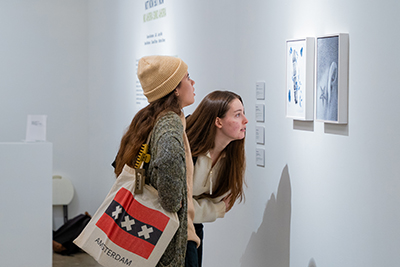
Gallery Tours
The Mandeville Art Gallery offers free 30 minute exhibition tours led by our Gallery Guides for both groups and individuals.
Gallery Guides are always available at our Welcome Desk to answer questions.